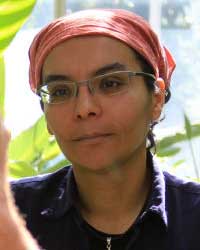American leaf-nosed bats and their close relatives have long been recognized for the diversity of their morphology, diets, and sensory traits. Until recently, however, the genomic correlates of such diversity were unknown. With students and many collaborators, we have spent the last two decades analyzing living and fossil species of noctilionoid bats and close relatives to discover when, where, and how their diversity has evolved and been maintained. These studies reveal this family has diversified relatively recently, across three centers of diversity in the Americas, and in tandem with adaptations to frugivory; molecular and trait diversity across the family suggests adaptation to establish mutualistic relationships with flowering plants. Together with their obvious dominance in the night skies of tropical America, these findings have established noctilionoid bats as an iconic adaptive radiation.

Liliana M. Dávalos is a Professor of Conservation Biology at Stony Brook University (New York). Her focus is on biodiversity and conserving the world’s life support systems into the future. In her research, she uses genetics, genomics, and statistical tools to discover mechanisms of extinction and survival. She received her B.Sc. in Biology from the Universidad del Valle, Cali, Colombia, and a Ph.D. in Ecology, Evolution, and Environmental Biology at Columbia University. She has published over 90 research papers, including work appearing in high-impact journals such as Science, Nature, and Current Biology. Dávalos is a 2012 National Academies of Sciences Education Fellow in the Life Sciences, a 2013 Kavli Frontiers of Science Fellow for an outstanding early career, has advised the United Nations Office of Drug and Crime on deforestation since 2007, and is a member of the Science Panel for the Amazon. She is a co-editor of The Origins of Cocaine (2018) with Professor Paul Gootenberg, a coauthor of the 2016 and contributor to the 2022 World Drug Report, and a co-editor of Phyllostomid Bats (2020) with Ted Fleming and Marco Mello.

